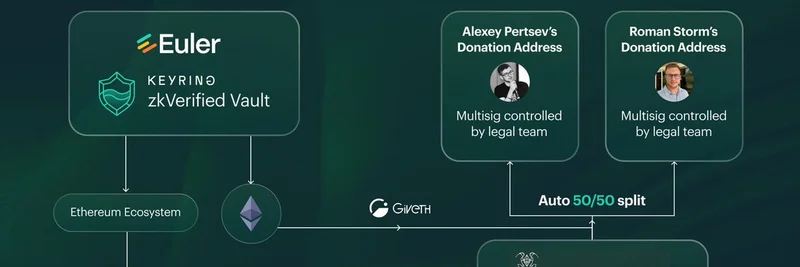Hey there, crypto enthusiasts! If you're deep into the world of meme tokens, you know how crucial privacy is for keeping your trades under wraps and avoiding those pesky front-runners. Well, a recent tweet from Vinay Vasanji at the Ethereum Foundation has shone a light on a cool new way the community is rallying around privacy advocates. Let's break it down step by step.
The Buzz from the Tweet
On October 10, 2025, Vinay Vasanji, who heads up funding coordination at the Ethereum Foundation, dropped a thread that's got everyone talking. He emphasized that "privacy is normal" and "writing code isn't a crime." The big news? The Foundation's team worked with Keyring Network to create a donation setup supporting Roman Storm and Alexey Pertsev—the brains behind Tornado Cash.
For the uninitiated, Tornado Cash is a decentralized privacy mixer on Ethereum. It lets users break the link between their transaction histories, making it harder for outsiders to track funds. This is super handy for meme token traders who want to launch or swap without tipping off bots or whales.
In the thread, Vinay explained that Keyring will channel 100% of protocol fees from their new zkVerified vaults straight to the legal defense funds for Storm and Pertsev for the first two months. You can check out more details in the Ethereum Foundation blog post.
Who Are Roman Storm and Alexey Pertsev?
These guys are developers who built Tornado Cash back in 2019 alongside Roman Semenov. It's an open-source tool designed to enhance transaction privacy on the blockchain. However, U.S. and Dutch authorities arrested them in 2022 and 2024, respectively, on charges related to money laundering and sanctions violations. The crypto community argues this is essentially prosecuting them for writing code, which many see as protected speech.
Storm and Pertsev are fighting appeals, and funds like @freealexeyroman have been set up to cover their legal costs. The Ethereum ecosystem views this as a pivotal battle for the future of open-source development in blockchain.
Breaking Down the Funding Mechanism
This isn't your typical GoFundMe-style campaign. Instead, it's a smart, programmable setup that ties real economic activity to charitable support. Keyring's zkVerified vaults are permissioned DeFi lending pools that use zero-knowledge proofs (zk) for compliance and privacy. Users can lend assets while keeping things verifiable without revealing sensitive info.
Here's the flow, as illustrated in the tweet's diagram:
- zkVerified Vault on Euler: This is the starting point, built on the Euler lending protocol. It generates protocol fees from DeFi activities.
- 100% of Protocol Fees: These flow into the Ethereum ecosystem and are routed through Giveth, a blockchain-based donation platform.
- Auto 50/50 Split: The fees are automatically divided equally between multisig wallets controlled by the legal teams for Alexey Pertsev and Roman Storm.
- Involvement of MolochDAO: The diagram also points to MolochDAO, a well-known DAO that funds Ethereum public goods, suggesting it might play a role in oversight or additional support.
This on-chain transparency ensures every fee contributes directly to the cause, creating a "flywheel" where DeFi growth fuels legal defense. It's a proof-of-concept for market-aligned funding, avoiding traditional donations that might distort incentives.
Why This Matters for Meme Tokens
At Meme Insider, we're all about meme tokens—the wild, community-driven coins that capture internet culture and can moon overnight. But with great volatility comes great need for privacy. Tools like Tornado Cash help degens mix their ETH before buying into the next hot meme, protecting against MEV (miner extractable value) attacks or doxxing.
If devs like Storm and Pertsev get railroaded, it could chill innovation in privacy tech. That'd be bad news for the meme ecosystem, where anonymity often fuels the fun and fairness. By supporting this fund through everyday DeFi use, you're not just earning yields—you're defending the principles that make meme tokens thrive.
Plus, this model could inspire similar setups for meme projects. Imagine a meme token DAO channeling trading fees to fund community causes or even legal shields for creators.
Wrapping It Up
The Ethereum Foundation's move with Keyring shows how blockchain can turn economic activity into social good. If you're into meme tokens or just value privacy in crypto, keep an eye on this. Head over to the Keyring developer legal defense fund page to learn how to get involved or create your own vault campaign.
What do you think—will this set a new standard for funding in crypto? Drop your thoughts in the comments below, and stay tuned to Meme Insider for more updates on how blockchain innovations are shaping the meme token landscape.


